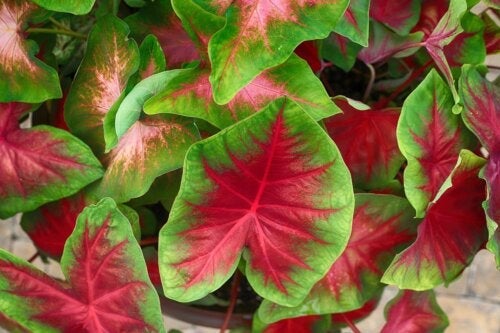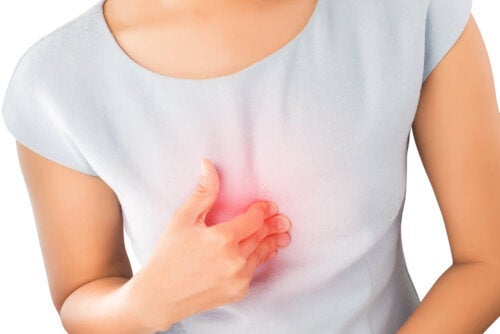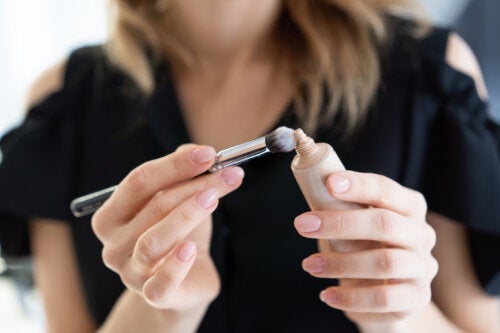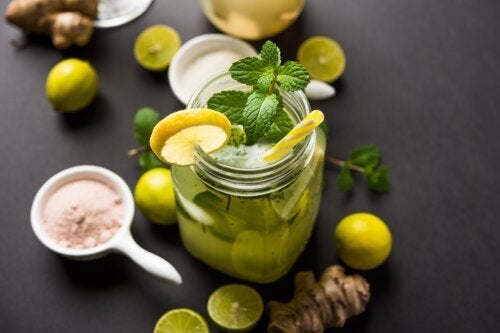5 theesoorten die helpen om gewicht te verliezen
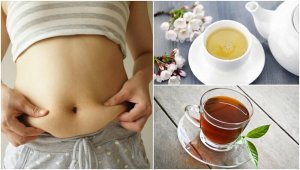
De volgende theesoorten zijn caloriearme drankjes die perfect in elk dieet passen, en ze kunnen je helpen om gewicht te verliezen. Natuurlijk zijn het geen toverdrankjes die lichaamsvet opeens laten verdwijnen, maar ze leveren wél bepaalde voedingsstoffen die de stofwisseling activeren.
Als je deze theesoorten regelmatig drinkt, dan helpt dat om je lichaam te ontgiften en je lijf te ontdoen van gifstoffen die ziektes kunnen veroorzaken. Bovendien kunnen ze je energieniveau verhogen en de onrust voorkomen die ervoor zorgt dat je teveel gaat eten.
Het effect van de theeën verschilt uiteraard per persoon. Dat effect is immers ook afhankelijk van je dagelijkse gewoontes en van hoe je lichaam werkt. Is het echter je doel om af te vallen, dan geldt in het algemeen dat de ideale combinatie bestaat uit:
- thee drinken
- gezond eten
- sporten
Laten we eens kijken naar welke theesoorten je kunnen helpen om gewicht te verliezen.
5 theesoorten die helpen om gewicht te verliezen
Groene thee
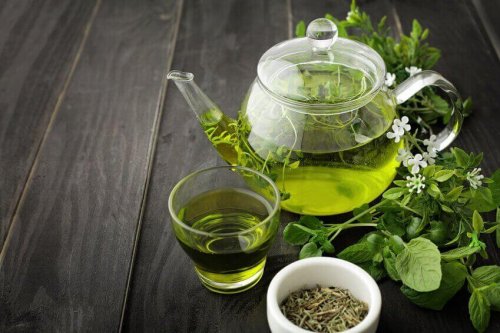
Ten eerste: groene thee. Deze thee staat bekend als één van de beste theesoorten die kunnen helpen om gewicht te verliezen. Het bevat antioxidanten en helpt je om binnen korte tijd vet te verliezen.
Groene thee bevat een hoge concentratie aan polyfenolen en mineralen die de aanmaak van vetophopingen verminderen. Bovendien ondersteunt het het proces waarbij lipiden worden omgezet in energie.
Een goed kopje groene thee zet je op de volgende manier.
Ingrediënten
- 5 gram groene thee
- 250 ml water
Bereiding
- Doe de groene thee met een kopje water in een pan.
- Breng vervolgens op laag vuur aan de kook.
- Haal de thee van het vuur.
- Wacht 10 minuutjes.
- Giet het drankje ten slotte nog even door een zeef.
Hoe drink je het?
- Drink groene thee bij voorkeur in de middag, en op een lege maag.
- Drink het ten minste driemaal per week.
Lees ook eens:
5 recepten voor theeën die je dikke darm ontgiften
Witte thee
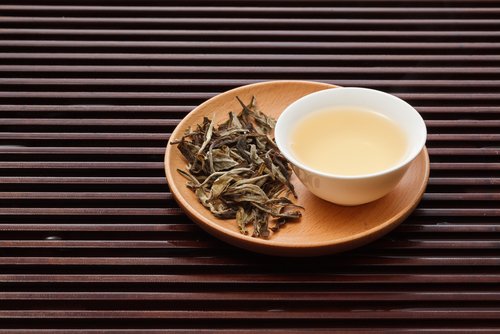
Als het gaat om gewichtsverlies, is witte thee volgens sommige mensen stukken effectiever dan groene thee. Het bevat meer antioxidanten dan groene thee, en het zou zelfs de vorming van vetcellen tegengaan.
Het reinigend effect stimuleert de afbraak van gifstoffen. Daarnaast helpt het de functies van het lymfestelsel te herstellen, in het geval dat je daar problemen mee hebt.
Volg onderstaande stappen voor een gezond kopje witte thee.
Ingrediënten
- 5 gram witte thee
- 250 ml water
Bereiding
- Doe de witte thee in een kopje water.
- Breng daarna aan de kook.
- Laat het 3 minuten op laag vuur staan.
- Haal de thee vervolgens van het vuur
- Wacht 10 minuutjes.
- Giet het drankje ten slotte door een zeefje.
Hoe drink je het?
- Drink een kopje witte thee op een lege maag, of tijdens het ontbijt.
- Probeer het elke dag te drinken.
Rode thee
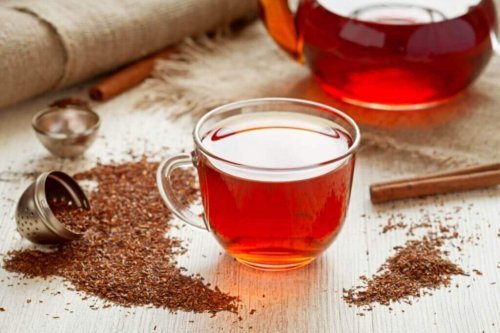
De blaadjes van rode thee, ook wel bekend als rooibosthee, komen van een rode plant die in Zuid-Afrika groeit. Het bevat onder anderen krachtige antioxidanten, en dat maakt het een van de beste theesoorten die je kunnen helpen om gewicht te verliezen.
Eén van zijn flavonoïden, aspalathine, vermindert de negatieve effecten van stresshormonen, en reduceert bijvoorbeeld angstgevoelens en hongergevoel.
Rooibosthee zet je op de volgende manier.
Ingrediënten
- 5 gram rode thee
- 250 ml water
Bereiding
- Doe een theelepel rode thee met een kopje water in een pan.
- Breng het daarna aan de kook.
- Dek het kopje vervolgens af.
- Wacht 10 minuutjes.
- Giet het drankje ten slotte nog door een zeef om het te filteren.
Hoe drink je het?
- Drink elke dag een kopje rode thee.
- Doe dit bij voorkeur halverwege de ochtend.
Misschien vind je dit ook interessant:
De vijf beste theesoorten die je rustig laten slapen
Laurierblad en kaneelthee
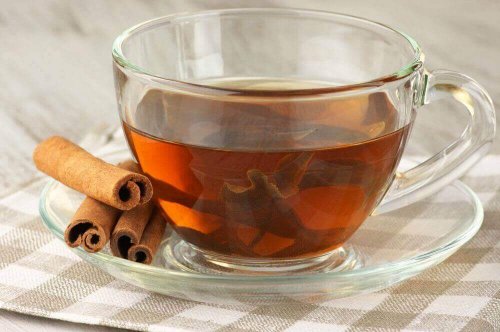
Laurierbladeren bevatten antioxidanten die het gewichtsverlagende effect van kaneel vergroten. De mix van ingrediënten maakt dat deze thee een ontgiftende werking heeft. Het reguleert bijvoorbeeld de bloedglucose.
Lees hieronder hoe je deze thee het beste kunt bereiden.
Ingrediënten
- 5 gram laurierbladeren
- 2 gram kaneel
- 250 ml water
Bereiding
- Doe de laurierbladeren samen met de kaneel met een kopje water in een pan.
- Breng het daarna aan de kook.
- Laat 10 minuten intrekken.
- Filter de thee ten slotte nog met een fijne zeef.
Hoe drink je het?
- Drink deze thee het liefst op een lege maag.
- Drink minstens 3 keer per week een kopje.
- Wil je je lichaam ontgiften? Drink het dan 3 weken achter elkaar.
Artisjok en citroenthee
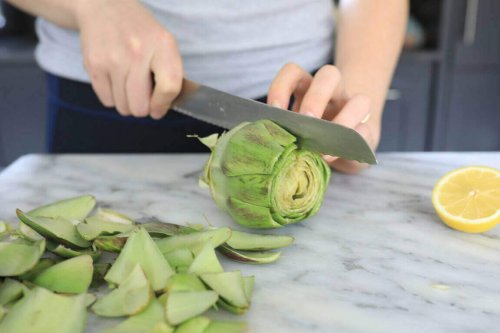
Ten slotte mag de volgende thee niet ontbreken in het rijtje van theesoorten die je helpen om gewicht te verliezen.
Deze natuurlijke thee van artisjok en citroensap, is populair geworden door zijn effect op gewichtsverlies. Het helpt voorkomen dat je lichaam vocht vasthoudt, en verbetert je stofwisseling waardoor je sneller vet kunt verbranden.
Volg onderstaande stappen voor een kopje artisjok- en citroenthee.
Ingrediënten
- 1 artisjok
- het sap van 1 citroen
- 500 ml water
Bereiding
- Snij de artisjok in kleine stukjes, en doe ze daarna in een pannetje met water.
- Breng aan de kook.
- Voeg de citroensap toe zodra het water met de artisjokken kookt.
- Laat het geheel daarna nog 15 minuten intrekken.
- Giet de thee ten slotte nog even door een zeef.
Hoe drink je het?
- Drink deze thee op een lege maag; het eerste kopje in de vroege ochtend, en daarna nog eentje halverwege de ochtend.
- Drink het elke dag, of tenminste driemaal per week.
De volgende theesoorten zijn caloriearme drankjes die perfect in elk dieet passen, en ze kunnen je helpen om gewicht te verliezen. Natuurlijk zijn het geen toverdrankjes die lichaamsvet opeens laten verdwijnen, maar ze leveren wél bepaalde voedingsstoffen die de stofwisseling activeren.
Als je deze theesoorten regelmatig drinkt, dan helpt dat om je lichaam te ontgiften en je lijf te ontdoen van gifstoffen die ziektes kunnen veroorzaken. Bovendien kunnen ze je energieniveau verhogen en de onrust voorkomen die ervoor zorgt dat je teveel gaat eten.
Het effect van de theeën verschilt uiteraard per persoon. Dat effect is immers ook afhankelijk van je dagelijkse gewoontes en van hoe je lichaam werkt. Is het echter je doel om af te vallen, dan geldt in het algemeen dat de ideale combinatie bestaat uit:
- thee drinken
- gezond eten
- sporten
Laten we eens kijken naar welke theesoorten je kunnen helpen om gewicht te verliezen.
5 theesoorten die helpen om gewicht te verliezen
Groene thee

Ten eerste: groene thee. Deze thee staat bekend als één van de beste theesoorten die kunnen helpen om gewicht te verliezen. Het bevat antioxidanten en helpt je om binnen korte tijd vet te verliezen.
Groene thee bevat een hoge concentratie aan polyfenolen en mineralen die de aanmaak van vetophopingen verminderen. Bovendien ondersteunt het het proces waarbij lipiden worden omgezet in energie.
Een goed kopje groene thee zet je op de volgende manier.
Ingrediënten
- 5 gram groene thee
- 250 ml water
Bereiding
- Doe de groene thee met een kopje water in een pan.
- Breng vervolgens op laag vuur aan de kook.
- Haal de thee van het vuur.
- Wacht 10 minuutjes.
- Giet het drankje ten slotte nog even door een zeef.
Hoe drink je het?
- Drink groene thee bij voorkeur in de middag, en op een lege maag.
- Drink het ten minste driemaal per week.
Lees ook eens:
5 recepten voor theeën die je dikke darm ontgiften
Witte thee

Als het gaat om gewichtsverlies, is witte thee volgens sommige mensen stukken effectiever dan groene thee. Het bevat meer antioxidanten dan groene thee, en het zou zelfs de vorming van vetcellen tegengaan.
Het reinigend effect stimuleert de afbraak van gifstoffen. Daarnaast helpt het de functies van het lymfestelsel te herstellen, in het geval dat je daar problemen mee hebt.
Volg onderstaande stappen voor een gezond kopje witte thee.
Ingrediënten
- 5 gram witte thee
- 250 ml water
Bereiding
- Doe de witte thee in een kopje water.
- Breng daarna aan de kook.
- Laat het 3 minuten op laag vuur staan.
- Haal de thee vervolgens van het vuur
- Wacht 10 minuutjes.
- Giet het drankje ten slotte door een zeefje.
Hoe drink je het?
- Drink een kopje witte thee op een lege maag, of tijdens het ontbijt.
- Probeer het elke dag te drinken.
Rode thee

De blaadjes van rode thee, ook wel bekend als rooibosthee, komen van een rode plant die in Zuid-Afrika groeit. Het bevat onder anderen krachtige antioxidanten, en dat maakt het een van de beste theesoorten die je kunnen helpen om gewicht te verliezen.
Eén van zijn flavonoïden, aspalathine, vermindert de negatieve effecten van stresshormonen, en reduceert bijvoorbeeld angstgevoelens en hongergevoel.
Rooibosthee zet je op de volgende manier.
Ingrediënten
- 5 gram rode thee
- 250 ml water
Bereiding
- Doe een theelepel rode thee met een kopje water in een pan.
- Breng het daarna aan de kook.
- Dek het kopje vervolgens af.
- Wacht 10 minuutjes.
- Giet het drankje ten slotte nog door een zeef om het te filteren.
Hoe drink je het?
- Drink elke dag een kopje rode thee.
- Doe dit bij voorkeur halverwege de ochtend.
Misschien vind je dit ook interessant:
De vijf beste theesoorten die je rustig laten slapen
Laurierblad en kaneelthee

Laurierbladeren bevatten antioxidanten die het gewichtsverlagende effect van kaneel vergroten. De mix van ingrediënten maakt dat deze thee een ontgiftende werking heeft. Het reguleert bijvoorbeeld de bloedglucose.
Lees hieronder hoe je deze thee het beste kunt bereiden.
Ingrediënten
- 5 gram laurierbladeren
- 2 gram kaneel
- 250 ml water
Bereiding
- Doe de laurierbladeren samen met de kaneel met een kopje water in een pan.
- Breng het daarna aan de kook.
- Laat 10 minuten intrekken.
- Filter de thee ten slotte nog met een fijne zeef.
Hoe drink je het?
- Drink deze thee het liefst op een lege maag.
- Drink minstens 3 keer per week een kopje.
- Wil je je lichaam ontgiften? Drink het dan 3 weken achter elkaar.
Artisjok en citroenthee

Ten slotte mag de volgende thee niet ontbreken in het rijtje van theesoorten die je helpen om gewicht te verliezen.
Deze natuurlijke thee van artisjok en citroensap, is populair geworden door zijn effect op gewichtsverlies. Het helpt voorkomen dat je lichaam vocht vasthoudt, en verbetert je stofwisseling waardoor je sneller vet kunt verbranden.
Volg onderstaande stappen voor een kopje artisjok- en citroenthee.
Ingrediënten
- 1 artisjok
- het sap van 1 citroen
- 500 ml water
Bereiding
- Snij de artisjok in kleine stukjes, en doe ze daarna in een pannetje met water.
- Breng aan de kook.
- Voeg de citroensap toe zodra het water met de artisjokken kookt.
- Laat het geheel daarna nog 15 minuten intrekken.
- Giet de thee ten slotte nog even door een zeef.
Hoe drink je het?
- Drink deze thee op een lege maag; het eerste kopje in de vroege ochtend, en daarna nog eentje halverwege de ochtend.
- Drink het elke dag, of tenminste driemaal per week.
Alle aangehaalde bronnen zijn grondig gecontroleerd door ons team om hun kwaliteit, betrouwbaarheid, actualiteit en geldigheid te waarborgen. De bibliografie van dit artikel werd beschouwd als betrouwbaar en wetenschappelijk nauwkeurig.
- Akbari, M., Lankarani, K. B., Tabrizi, R., Ghayour-Mobarhan, M., Peymani, P., Ferns, G., Ghaderi, A., & Asemi, Z. (2019). The Effects of Curcumin on Weight Loss Among Patients With Metabolic Syndrome and Related Disorders: A Systematic Review and Meta-Analysis of Randomized Controlled Trials. Frontiers in Pharmacology, 10, 649. https://www.ncbi.nlm.nih.gov/pmc/articles/PMC6582779/
- Belfarhi, Leila & Bouhenna, Mustapha & Bouafir, Yesmine & Boumehira, Ali & Nebbak, Amira & Ziani, Borhane E.C. & Bachari, K. & Joe Dailin, Daniel & Ho, Ting & El Enshasy, Hesham. (2020). Medicinal proprieties and toxicology of therapeutic herbal tea: A review. Bioscience Research, 17, 793-814. https://www.researchgate.net/publication/342008882_Medicinal_proprieties_and_toxicology_of_therapeutic_herbal_tea_A_review
- Cassels, B. K., Fuentes-Barros, G., & Castro-Saavedra, S. (2019). Boldo, Its Secondary Metabolites and their Derivatives. Current Traditional Medicine, 5(1), 31-65. https://www.eurekaselect.com/article/94484
- Chang, H. C., Peng, C. H., Yeh, D. M., Kao, E. S., & Wang, C. J. (2014). Hibiscus sabdariffa extract inhibits obesity and fat accumulation, and improves liver steatosis in humans. Food & Function, 5(4), 734-739. https://pubmed.ncbi.nlm.nih.gov/24549255/
- Chen, S., Osaki, N., & Shimotoyodome, A. (2015b). Green tea catechins enhance norepinephrine-induced lipolysis via a protein kinase A-dependent pathway in adipocytes. Biochemical And Biophysical Research Communications, 461(1), 1-7. https://www.sciencedirect.com/science/article/abs/pii/S0006291X15006269
- Da Costa Soares, A. P., De Faria, N. C., Graciano, G. F., Da Silva, J. A., Gonçalves, V. S. D. S., Del Carmen Trancoso Valenzuela, V., Correia, M. I. T. D., & Anastácio, L. R. (2022). Ginger infusion increases diet-induced thermogenesis in healthy individuals: A randomized crossover trial. Food Bioscience, 50, 102005. https://www.sciencedirect.com/science/article/abs/pii/S2212429222004655
- De Faria, N. C., Da Costa Soares, A. P., Graciano, G. F., Correia, M. I. T. D., Del Carmen T Valenzuela, V., & Anastácio, L. R. (2022). Acute green tea infusion ingestion effect on energy metabolism, satiety sensation and food intake: A randomized crossover trial. Clinical Nutrition ESPEN, 48, 63-67. https://www.sciencedirect.com/science/article/abs/pii/S2405457722000456
- Fan, S., Raychaudhuri, S., Kraus, O., Shahinozzaman, M., Lofti, L., & Obanda, D. N. (2020). Urtica dioica Whole Vegetable as a Functional Food Targeting Fat Accumulation and Insulin Resistance-a Preliminary Study in a Mouse Pre-Diabetic Model. Nutrients, 12(4), 1059. https://www.ncbi.nlm.nih.gov/pmc/articles/PMC7231388/
- Fernandes, R. C., Araújo, V. A., Giglio, B. M., Marini, A. C. B., Mota, J. F., Teixeira, K. S., Monteiro, P. A., Lira, F. S., & Pimentel, G. D. (2018). Acute Epigallocatechin 3 Gallate (EGCG) Supplementation Delays Gastric Emptying in Healthy Women: A Randomized, Double-Blind, Placebo-Controlled Crossover Study. Nutrients, 10(8), 1122. https://www.mdpi.com/2072-6643/10/8/1122
- He, R. R., Chen, L., Lin, B. H., Matsui, Y., Yao, X. S., & Kurihara, H. (2009). Beneficial effects of oolong tea consumption on diet-induced overweight and obese subjects. Chinese Journal of Integrative Medicine, 15(1), 34–41. https://pubmed.ncbi.nlm.nih.gov/19271168/
- Heydarian, A., Tahvilian, N., Shahinfar, H., Abbas-Hashemi, S. A., Daryabeygi-Khotbehsara, R., & Aryaeian, N. (2023). Effect of cardamom consumption on inflammation and blood pressure in adults: A systematic review and meta-analysis of randomized clinical trials. Food Science & Nutrition, 12(1), 3-12. https://www.ncbi.nlm.nih.gov/pmc/articles/PMC10804083/
- Huang, J., Wang, Y., Xie, Z., Zhou, Y., Zhang, Y., & Wan, X. (2014). The anti-obesity effects of green tea in human intervention and basic molecular studies. European Journal Of Clinical Nutrition, 68(10), 1075-1087. https://www.nature.com/articles/ejcn2014143
- Jiang, J., Emont, M. P., Jun, H., Qiao, X., Liao, J., Kim, D. I., & Wu, J. (2017). Cinnamaldehyde induces fat cell-autonomous thermogenesis and metabolic reprogramming. Metabolism: Clinical and Experimental, 77, 58–64. https://www.ncbi.nlm.nih.gov/pmc/articles/PMC5685898/
- Jurgens, T. M., Whelan, A. M., Killian, L., Doucette, S., Kirk, S., & Foy, E. (2012). Green tea for weight loss and weight maintenance in overweight or obese adults. The Cochrane Database of Systematic Reviews, 12(12), CD008650. https://www.ncbi.nlm.nih.gov/pmc/articles/PMC8406948/
-
Kaçak, K., Yaman, T., Uyar, A., & Kömüroğlu, A. U. (2024). Inhibitory effect of stinging nettle (Urtica dioica L.) extract on body weight gain in rats on a high-fat diet. Przeglad Gastroenterologiczny, 19(1), 23–32 https://www.ncbi.nlm.nih.gov/pmc/articles/PMC10985764/
- Kasprzak-Drozd, K., Oniszczuk, T., Gancarz, M., Kondracka, A., Rusinek, R., & Oniszczuk, A. (2022). Curcumin and Weight Loss: Does It Work? International Journal of Molecular Sciences, 23(2), 639. https://www.ncbi.nlm.nih.gov/pmc/articles/PMC8775659/
- Liu, H., Li, J., Lin, S., Liu, T., & Zheng, C. (2021). Effects of dietary fennel (Foeniculum vulgare Mill.) seed powder supplementation on growth performance, nutrient digestibility, small intestinal morphology, and carcass traits of broilers. PeerJ, 9, e10308. https://www.ncbi.nlm.nih.gov/pmc/articles/PMC7847707/
- Mansour, M. S., Ni, Y. M., Roberts, A. L., Kelleman, M., Roychoudhury, A., & St-Onge, M. P. (2012). Ginger consumption enhances the thermic effect of food and promotes feelings of satiety without affecting metabolic and hormonal parameters in overweight men: a pilot study. Metabolism: Clinical and Experimental, 61(10), 1347–1352. https://pubmed.ncbi.nlm.nih.gov/22538118/
- Ojulari, O. V., Lee, S. G., & Nam, J. O. (2019). Beneficial Effects of Natural Bioactive Compounds from Hibiscus sabdariffa L. on Obesity. Molecules, 24(1), 210. https://www.ncbi.nlm.nih.gov/pmc/articles/PMC6337177/
- Pan, H., Gao, Y., & Tu, Y. (2016). Mechanisms of Body Weight Reduction by Black Tea Polyphenols. Molecules, 21(12), 1659. https://www.ncbi.nlm.nih.gov/pmc/articles/PMC6273558/
- Ponder, A., & Hallmann, E. (2019). Phenolics and Carotenoid Contents in the Leaves of Different Organic and Conventional Raspberry (Rubus idaeus L.) Cultivars and Their In Vitro Activity. Antioxidants, 8(10), 458. https://www.ncbi.nlm.nih.gov/pmc/articles/PMC6827140/
- Qin, B., Panickar, K. S., & Anderson, R. A. (2010). Cinnamon: potential role in the prevention of insulin resistance, metabolic syndrome, and type 2 diabetes. Journal of Diabetes Science and Technology, 4(3), 685-693. https://www.ncbi.nlm.nih.gov/pmc/articles/PMC2901047/
- Rezaee, Z., & Rashidlamir, A., & Krüger, K., & Oral, O. (2022). White Tea a Potential Herbal Drink for Weight Loss? A Narrative Review. Scientific Chronicles, 27(3), 419-430. https://www.researchgate.net/publication/367157366_Is_White_Tea_a_Potential_Herbal_Drink_for_Weight_Loss_A_Narrative_Review
- Salem, M. B., Affes, H., Ksouda, K., Dhouibi, R., Sahnoun, Z., Hammami, S., & Zeghal, K. M. (2015). Pharmacological Studies of Artichoke Leaf Extract and Their Health Benefits. Plant Foods For Human Nutrition, 70(4), 441-453. https://link.springer.com/article/10.1007/s11130-015-0503-8
- Sanderson, M., Mazibuko, S. E., Joubert, E., de Beer, D., Johnson, R., Pheiffer, C., Louw, J., & Muller, C. J. (2014). Effects of fermented rooibos (Aspalathus linearis) on adipocyte differentiation. Phytomedicine: International Journal of Phytotherapy and Phytopharmacology, 21(2), 109–117. https://pubmed.ncbi.nlm.nih.gov/24060217/
- Silva, M. L., Bernardo, M. A., Singh, J., & de Mesquita, M. F. (2022). Cinnamon as a Complementary Therapeutic Approach for Dysglycemia and Dyslipidemia Control in Type 2 Diabetes Mellitus and Its Molecular Mechanism of Action: A Review. Nutrients, 14(13), 2773. https://www.ncbi.nlm.nih.gov/pmc/articles/PMC9269353/
- Singletary, K. (2022). Cardamom. Potential Health Benefits. Nutrition Today, 57(1), 38-49. https://journals.lww.com/nutritiontodayonline/fulltext/2022/01000/cardamom__potential_health_benefits.8.aspx
- Sirotkin, A. V., & Kolesárová, A. (2021). The anti-obesity and health-promoting effects of tea and coffee. Physiological Research, 70(2), 161–168. https://www.ncbi.nlm.nih.gov/pmc/articles/PMC8820582/
- Vinokur, Y., Rodov, V., Reznick, N., Goldman, G., Horev, B., Umiel, N., & Friedman, H. (2006). Rose Petal Tea as an Antioxidant-rich Beverage: Cultivar Effects. Llull: Revista de la Sociedad Española de Historia de las Ciencias y de las Técnicas, 9(16), 35-54. https://dialnet.unirioja.es/servlet/articulo?codigo=62037
- Yılmaz, B., & Acar‐Tek, N. (2023). White tea: Its history, composition, and potential effects on body weight management. eFood, 4(3), 1-11. https://onlinelibrary.wiley.com/doi/full/10.1002/efd2.89
- Zheng, J., Zheng, S., Feng, Q., Zhang, Q., & Xiao, X. (2017). Dietary capsaicin and its anti-obesity potency: from mechanism to clinical implications. Bioscience Reports, 37(3), 1-10. https://www.ncbi.nlm.nih.gov/pmc/articles/PMC5426284/
Deze tekst wordt alleen voor informatieve doeleinden aangeboden en vervangt niet het consult bij een professional. Bij twijfel, raadpleeg uw specialist.

